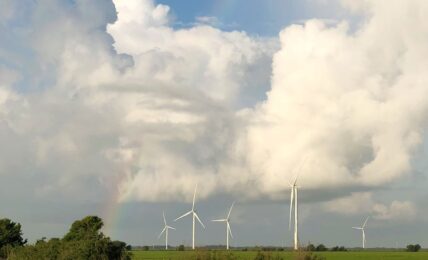CRM solutions provider Salesforce announced today a series of new features for its Net Zero Cloud sustainability management solution, including capabilities supporting companies required to meet upcoming European sustainability disclosure requirements, and AI-based features to help streamline ESG reporting.
Salesforce launched Net Zero Cloud in 2019 (as “Sustainability Cloud”) to provide users with a 360-degree view of their environmental impact with the ability to track, analyze and report reliable environmental data, and has announced a series of updates including the release of Net Zero Cloud 2.0 last year, integrating solutions from across the company’s portfolio including supplier collaboration technology and CRM dashboards, the addition of social and governance data management capabilities in December 2022, and the integration of capabilities enabling users to automate the disclosure of ESG data in alignment with the Sustainability Accounting Standards Board (SASB) standards earlier this year.
The platform’s new capabilities come as companies globally are coming under increasing pressure to meet climate and ESG regulatory requirements, including the EU’s upcoming Corporate Sustainable Reporting Directive (CSRD).
The CSRD will significantly expand the number of companies required to provide sustainability disclosures to over 50,000 from around 12,000 currently – including large non-EU companies – and introduce more detailed reporting requirements on company impacts on the environment, human rights and social standards and sustainability-related risk. Some companies will be required to begin reporting under the CSRD as soon as 2024.
Net Zero Cloud’s new capabilities include CSRD Report Builder, which automates report generation in alignment with CSRD requirements, including double materiality, and Materiality Assessment, helping companies to identify ESG topics that are most material to their business. The EU’s reporting rules allow companies to focus reporting primarily on sustainability factors that they consider material to their businesses, based on materiality assessments.
Salesforce also unveiled Einstein for Net Zero Cloud, with anticipated availability in Spring 2024, utilizing Salesforce’ Einstein AI platform’s capabilities to suggest auto-generated responses for ESG reports, in line with specific reporting framework criteria.
Ari Alexander, VP and GM of Net Zero Cloud, Salesforce, said:
“Meaningful corporate transparency benefits us all, yet businesses can find themselves lost in the complex landscape of regulatory frameworks. Equipped with Einstein, Net Zero Cloud will help simplify the process of reporting ESG data, offering a valuable solution that any company can leverage toward achieving net zero.”



